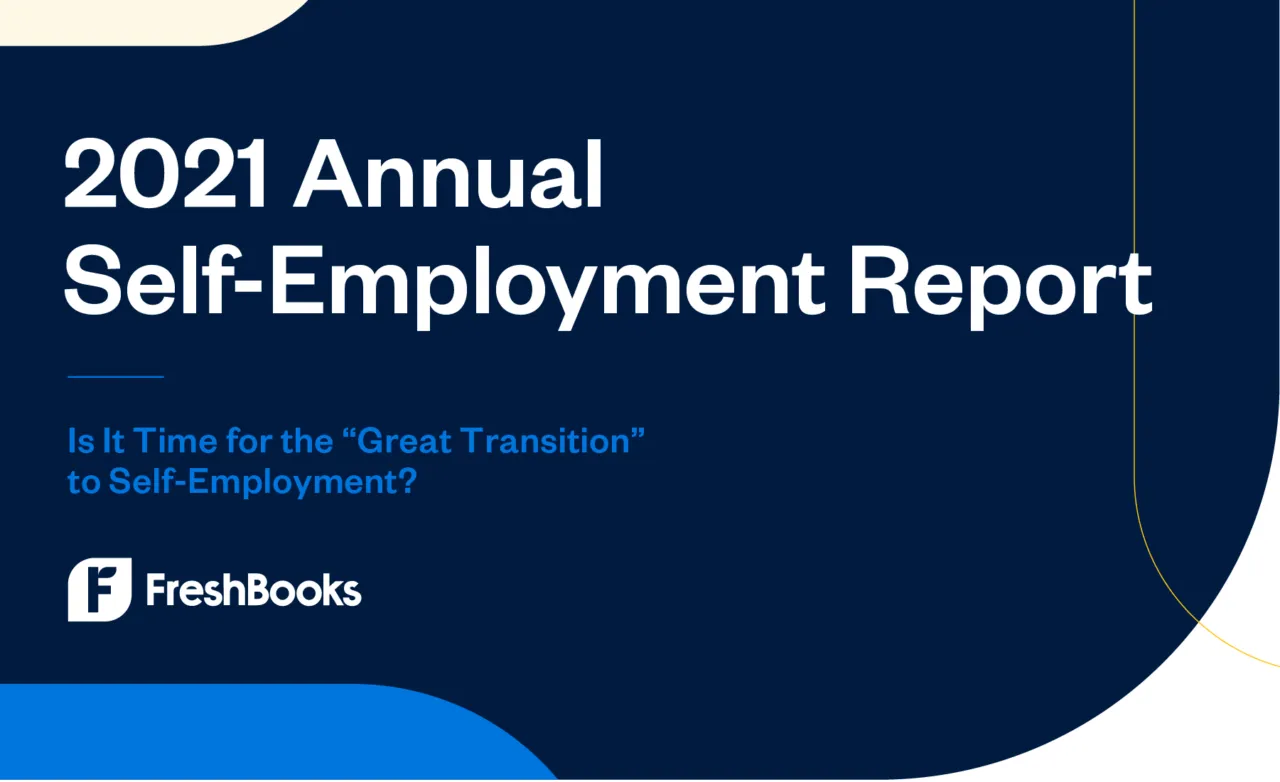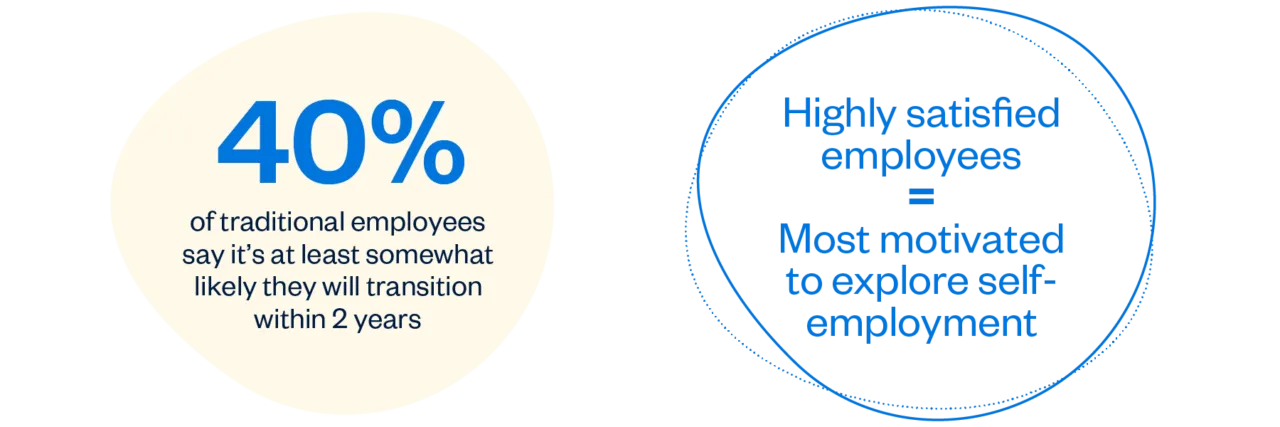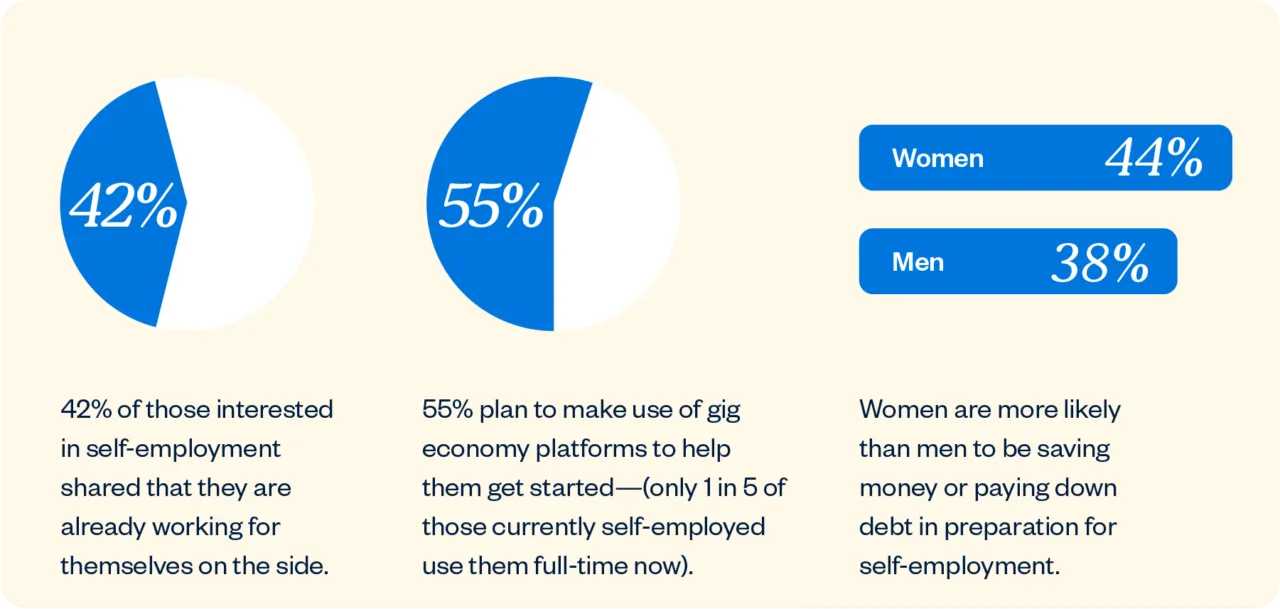FreshBooks 2021 Annual Self-Employment Report

Download the full report here.
Is It Time for the “Great Transition” to Self-Employment?
Many people dream of starting a business but are rightly cautious about taking the first steps. Entrepreneurship, by definition, is a risky and uncertain proposition particularly in present times. Yet the rewards of self employment – both personal and financial – are relatively plain to see.
This is a topic we’ve been studying over the years at FreshBooks. One of our goals is to deepen the narrative around self-employment through our research and insights.
Every year, we publish a report focused on trends in self-employment. In early 2020, prior to the pandemic, we surveyed many thousands of American full-time workers about their career challenges and aspirations. While we did not publish our results at the time, this data helps us offer a unique perspective as to how COVID-19 has shifted the narrative.
In this year’s Annual Report, we study how the narrative around self-employment is shifting in the United States. We focus on the following important social trends: COVID-19, meaningful careers, work/life, gender equality, racial equality, and workforce sustainability.
Top 10 Highlights
- Undeterred by the pandemic, 95% of self-employed Americans plan to stay self-employed for the foreseeable future.
- Among owners of businesses less than 2 years old, nearly two-thirds agree that self-employment remains the best career choice in uncertain times such as a pandemic. 2 in 5 recent entrepreneurs say COVID-19 at least in part created their opportunity for self-employment.
- An unprecedented number of traditionally employed Americans are now contemplating self-employment. Overall, 40% say it’s at least somewhat likely they’ll work for themselves within the next two years. The numbers are even higher among those under 35 and/or the highly educated (>50%).
- The vast majority of would-be entrepreneurs will choose (86%) vs. be forced (14%) into self-employment. Among them, almost half say it is their top goal in life.
- The pursuit of career control and/or fulfillment is more likely driving interest in self-employment vs. financial gain, as observed in past years. 20% of this group look to self-employment as a path to complete career transformation.
- Paradoxically, the more satisfied a traditional employee is at work, the more they are likely contemplating self-employment – a fact that will further complicate corporate America’s response to the Great Resignation.
- Two in five potential entrepreneurs have an active ‘side hustle.’ 1/3 are brand building via social media. Half say they will definitely use gig-economy platforms to help them find customers, should they make the leap to self-employment (only a small fraction of full-time small business owners use them today).
- Traditionally employed women are drawn to self-employment for somewhat different reasons than men – more cite change and/or fulfillment for example – but notably, men and women are equally motivated by family concerns.
- Gender-based discrimination in the workplace remains a factor as nearly two-thirds of women considering self-employment say it’s at least a partial motivator.
- Though self-employed women today are just as satisfied with and committed to their careers as their male counterparts, some continue to experience gender-based challenges, like being taken less seriously than or having to work harder than men doing the same work (about 1 in 4 agree).
Methodology
FreshBooks conducted research for this report in collaboration with Dynata. More than 3,000 people who work full-time – either as traditional employees, independent professionals, or small business owners – were surveyed online in August and September 2021. Samples have been weighted (as required) to reflect various characteristics of their target populations (e.g., age, gender, and industry) leveraging data from the U.S. Census, U.S. Small Business Administration, the NAICS Association, and other sources. The study’s margin of error is +/- 2.5% at 95% confidence.
The Bigger Picture
What is the importance of self-employment in light of major shifts in the global economy overall?
The findings in our 2021 report take place against a backdrop of unprecedented (in recent times) challenges to human health and well-being. Many people, especially parents and women, in addition to marginalized groups, are struggling to keep up with the pace of the global economy.
Meanwhile, people are paying more attention to health and wellness due to the media’s focus on public health over the last several years. With the COVID-19 pandemic lingering, it’s likely that people will be taking measures to protect themselves—and choose not to return to the office.
American workers are feeling emboldened to make big changes in their lives. For those who have lost their jobs or suffered health setbacks, there may be no other choice. Regardless of the circumstances, self-employment is on a lot of peoples’ minds.
Here’s a deeper look into the story.
Theme 1
The COVID-19 Effect
COVID-19 has been a catalyst for economic change in a way that our global society could never have anticipated. While some businesses have had no choice but to shut down, scale back, or lay off their employees, others have seized on new opportunities, like accelerated digital adoption, to survive and thrive. Given this greater context, many people are revisiting their relationships with their careers.
Our research looks at two groups: Full-time workers in America who are already self-employed and those who are actively thinking about it. Against a seemingly unending backdrop of pandemic uncertainty, we find the entrepreneurial spirit to be alive and well among both groups.
- 95% of those currently self-employed intend to stay that way, and the majority will pursue ambitious growth strategies in the coming years (unchanged from pre-COVID comparables).
- 40% of those traditionally employed say it’s at least somewhat likely they will be self-employed in 2 years (up from 29% in pre-pandemic 2020). 84% of them say COVID is at least partly responsible.
- Even among owners who started small businesses in the COVID era, most (63%) continue to believe that “self-employment is the best career choice in uncertain times such as a pandemic.”
- Career satisfaction among owners of COVID-era business upstarts is high (70%) with one-in-five acknowledging that if not for the pandemic, they would not be self-employed today.
Small business owners have also coped well with particular COVID challenges, like managing their teams remotely, or adapting their delivery models in light of social distancing, PPE and other such rules.

Theme 2
Meaningful Careers
Human psychology research has found that we thrive on finding meaning and purpose in our chosen career paths. 9 out of 10 people are willing to accept less pay for more meaningful work. But many workers aren’t feeling fulfilled in their careers, with others experiencing burn-out due to the many pressures (societal, economic and otherwise) of the pandemic.

More American workers than ever are looking to self-employment as the solution. 40% of traditional employees say it’s at least somewhat likely they will transition within two years (one-quarter say it’s very likely). Among them almost half say it is their number one goal in life. More than 60% of younger employees (under 35) could explore self-employment in the next 5 years.

Yet our research finds, paradoxically, that the more satisfied someone is at work, the more likely they are to be considering self-employment. Moreover, these highly satisfied employees are among the most motivated to explore self-employment as two thirds say it’s their number one goal in life.
Though it’s unclear why highly satisfied employees are contemplating self-employment in such high numbers, it’s abundantly clear that this will make it even more difficult for corporate America to retain its youngest, best, and most talented employees during the Great Resignation.
Theme 3
Work/Life
The topics of health, wellness, and self-care have taken center stage due to the pandemic, with more people taking their health into their own hands. Our study does find ‘better health and wellness’ to be among the reasons people are considering self-employment, but not the main reason. As observed in past years, aspiring self-employed professionals are more likely motivated by a desire for career control, job fulfillment, and financial gain. There are gender differences – men (21%) are more likely than women (14%) to pursue self-employment for financial reasons. Women are more concerned with career fulfillment and/or career change. Notably, men and women are equally likely to be contemplating self-employment mainly for family reasons (15%).


Overall, would-be entrepreneurs expect their careers, if not lives, to improve across multiple dimensions. But how does this square with the reality of owning a small business? Compared to when they were fully employed, today’s entrepreneurs say they have less work stress (60%), have better work-life balance (68%), and are in better health (46%) A slim majority say they work harder (53%), but in exchange, most earn more (57%). Perhaps most telling, 65% of self-employed people disagree with the statement “I envy people with good traditional jobs.”
Theme 4
Gender Equality
Long before the pandemic, women’s lack of equality in the workplace has been an issue. We know from various sources that women earn less, are more likely overlooked for promotions, and do not receive the mentorship that they need to advance in their careers compared with men. COVID-19 has made the situation worse for women who are opting out of their careers altogether.
Many women view self-employment as a way around workplace gender discrimination. As observed in prior years, more than half of those interested in self-employment say their personal experiences with gender discrimination are a factor. Almost 8 in 10 of these women also believe their careers will advance more quickly as entrepreneurs vs employees (up from 69% in 2020). Younger women are most likely to have experienced overt discrimination, while more women of color more often feel their careers are advancing less quickly than they could or should.
At a high level, the experiences of today’s women entrepreneurs support the notion that self-employment is the better choice. Almost 80% are happier with their careers, and 70% say they have much more career control vs. when they held traditional jobs. Most earn the same or more money (75%) while managing to improve work-life balance (69%) and not take on additional work stress (78%).
And while gender discrimination still exists for self-employed women, some things are trending in the right direction. Though 25% still believe they have to work harder than their male peers to succeed, this is down from 31% in our most recent study. More self-employed women than in previous years disagree that they’re taken less seriously than men (44%), or must charge less for equivalent work (51%).
Theme 5
Racial Equality
Racial equality at work is an ongoing systemic challenge that has worsened during the pandemic, especially for Black and Hispanic women. Many believe diversity and inclusion efforts are not advancing racial equality fast enough. Self-employment offers a path forward.
Our research finds that relatively more visible minorities (36%) cite self-employment as their top life goal compared to white respondents (28%). Women who are visible minorities (42%) more likely consider self-employment as a way to accelerate their careers vs white women (33%).

Visible minorities are most likely to pursue self-employment for more career fulfillment, while white respondents seek more career control. About 10% of people of color were motivated by a “negative work” situation to consider self-employment.
One challenge that stands in the way of self-employment for people of color is financial. In our survey, 30% of respondents identifying as visible minorities said that paying down debt is one of the main barriers to becoming self-employed.
Making Self-Employment a Reality
As tens of millions of workers contemplate self-employment, it has arguably become the new American Dream. How are they preparing themselves for, and what is stopping them from, taking the plunge?
- Access to benefits and healthcare is a blocker for many, particularly for older people. Among prospective entrepreneurs, 39% of those over the age of 55 expressed that access to benefits was a challenge vs. 21% for people below the age of 55.
- Women (28%) are more likely than men (20%) to cite access to benefits as a barrier to entrepreneurship.
- The most commonly cited obstacles to self-employment overall include worries about cash flow and inconsistent income (32%), worries about earning less income (28%), loyalty to employers (27%), and lack of a business plan (25%).



At the same time, these next-generation entrepreneurs are preparing for their career shifts as follows:
- 42% of those interested in self-employment shared that they are already working for themselves on the side
- Women (44%) are more likely to be saving money or paying down debt in preparation for self-employment, compared to 38% of men
- 55% plan to make use of gig economy platforms to help them get started—(only one in five of those currently self-employed full time use them now.)

Other steps that people are taking include lining up investors and tapping into their networks for support.
We understand that not all of the tens of millions of Americans who dream about self-employment will follow through and take the plunge. Yet, if even a fraction do, this could have profound effects on the economy and society overall.
But for many, support is a distant dream. Until then, we can expect to see people persisting, nevertheless.
About FreshBooks
FreshBooks is changing the way business owners manage their books. Its owner-first accounting platform, loved by businesses in over 160 countries, takes an easy-to-use approach to managing finances, billing, payments, and client engagement. FreshBooks, known for its 11x Stevie Award-winning customer support, serves customers of all sizes from offices in Canada, Croatia, Mexico, Netherlands, Germany and the U.S.
Survey Methodology
FreshBooks conducted the study for this report in collaboration with Dynata. More than 3,000 people who work full-time—either as traditional employees, independent professionals, or small business owners—were surveyed online in August and September 2021. Samples have been weighted (as required) to reflect various characteristics of their target populations (e.g., age, gender, and industry) leveraging data from the U.S. Census, U.S. Small Business Administration, the NAICS Association, and other sources. The study’s margin of error is +/- 2.5% at 95% confidence.
PR Contact:
Megan Shay
FreshBooks
megan.shay@freshbooks.com


Share: